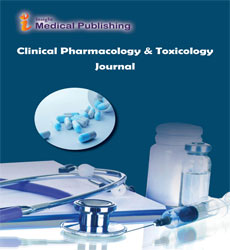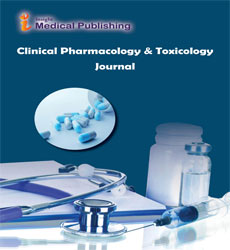Clinical Applications of Biologics and Biosimilars
*Corresponding author:
Harian Fridli,
Department of Experimental and Clinical Biomedical Sciences “M. Serio”, University of Florence, 50134 Florence, Italy,
E-mail: Fridli.harian@unifi.it
Received date: February 01, 2025, Manuscript No. iprrt-25-20703; Editor assigned date: February 03, 2025, PreQC No. iprrt-25-20703 (PQ); Reviewed date: February 15, 2025, QC No. iprrt-25-20703; Revised date: February 22, 2025, Manuscript No. iprrt-25-20703 (R); Published date: February 28, 2025
Citation: Fridli H (2025) Clinical Applications of Biologics and Biosimilars. Clin Phar Toxi Jour Vol.09 No.1:02
Abstract
Introduction
Biologics, therapeutic products derived from living organisms, have transformed modern medicine by offering targeted and highly specific interventions for complex diseases. Unlike traditional small-molecule drugs, biologics are large, complex molecules, including monoclonal antibodies, recombinant proteins, vaccines and cell-based therapies. Their specificity allows them to modulate precise molecular pathways, providing efficacy in conditions that were previously difficult to treat. Biosimilars, developed as near-identical alternatives to approved biologics, aim to increase patient access by reducing costs while maintaining comparable safety and efficacy. The clinical application of biologics and biosimilars spans oncology, immunology, endocrinology and infectious diseases, highlighting their central role in contemporary therapeutic strategies. Advances in biotechnology, regulatory science and clinical research have expanded the scope of these therapies, offering new opportunities for personalized medicine and improved patient outcomes [1].
Description
Biologics function by specifically targeting molecular mechanisms underlying disease processes. Monoclonal AntiBodies (mAbs) are among the most widely used biologics, engineered to recognize unique epitopes on proteins involved in disease pathways. In oncology, mAbs such as trastuzumab and rituximab target tumor-specific antigens, facilitating immune-mediated destruction of malignant cells or blocking proliferative signaling. Similarly, in autoimmune diseases, biologics like adalimumab and infliximab neutralize pro-inflammatory cytokines such as Tumor Necrosis Factor-Alpha (TNF-α), reducing tissue damage and clinical symptoms. Biologicsâ?? ability to interact selectively with molecular targets underpins their superior efficacy and safety profile compared to conventional small-molecule therapies. Biosimilars, developed after the expiration of original biologic patents, offer clinically comparable alternatives. Regulatory frameworks require demonstration of similarity in structure, function, pharmacokinetics, pharmacodynamics and immunogenicity. Biosimilars provide economic advantages by lowering treatment costs and increasing patient access to life-saving therapies. For example, biosimilars of infliximab and trastuzumab have been integrated into clinical practice, maintaining therapeutic outcomes while reducing financial burden. Their introduction encourages competition and innovation, supporting broader availability of biologic therapies in healthcare systems globally [2].
Clinical applications of biologics extend to inflammatory and autoimmune diseases, where dysregulated immune responses drive pathology. Biologics targeting interleukins (IL-6, IL-17, IL-23) or immune checkpoint molecules (PD-1, CTLA-4) have revolutionized treatment options. In rheumatoid arthritis, psoriasis and inflammatory bowel disease, biologics achieve disease remission or low disease activity in patients unresponsive to conventional therapy. Biosimilars provide equivalent therapeutic benefits, allowing long-term management of chronic conditions with reduced healthcare costs [1]. Personalized therapy is enhanced through biomarker-guided selection, ensuring that patients receive biologics most likely to be effective based on their molecular profiles.
In oncology, biologics and biosimilars are essential components of targeted therapy and immunotherapy. Immune checkpoint inhibitors, such as pembrolizumab and nivolumab, enhance anti-tumor immunity by blocking inhibitory signals on T cells. Monoclonal antibodies combined with cytotoxic agents enable targeted drug delivery, improving efficacy while minimizing systemic toxicity. Biosimilars of trastuzumab and bevacizumab have expanded access to these life-saving treatments, particularly in resource-limited settings. Furthermore, biologics are integral to the development of chimeric antigen receptor (CAR) T-cell therapy, where patient T cells are engineered to express receptors targeting specific tumor antigens, exemplifying precision medicine in oncology [2].
Biologics also play a pivotal role in infectious diseases and vaccination. Recombinant proteins and monoclonal antibodies have been used for prophylaxis and treatment of viral infections, including respiratory syncytial virus, hepatitis B and SARS-CoV-2. These biologics neutralize pathogens or modulate immune responses, providing protection in high-risk populations. Biosimilars of therapeutic antibodies and recombinant proteins support broader immunization campaigns and treatment accessibility, enhancing public health outcomes. Endocrinology and metabolic disorders benefit from biologics such as recombinant insulin, growth hormone and glucagon-like peptide-1 (GLP-1) analogs. These therapies address deficiencies or dysregulations in hormone pathways with precise pharmacological effects. Biosimilar insulins have improved affordability and adherence, particularly for patients with diabetes requiring lifelong therapy. By ensuring comparable pharmacokinetics and efficacy, biosimilars maintain glycemic control while expanding access to treatment. The integration of biologics and biosimilars into clinical practice requires careful monitoring for immunogenicity, adverse events and therapeutic interchangeability. Although biosimilars are highly similar to reference biologics, slight differences in manufacturing processes can influence protein structure and immune recognition. Clinicians must evaluate safety data, patient response and regulatory guidance to ensure appropriate substitution. Pharmacovigilance systems and post-marketing surveillance are essential for monitoring long-term outcomes and maintaining confidence in biosimilar use [1].
Conclusion
Biologics and biosimilars have transformed the landscape of modern medicine, offering targeted, highly specific and effective therapies for oncology, autoimmune disorders, infectious diseases and metabolic conditions. Biologicsâ?? precision in modulating molecular pathways allows for improved therapeutic outcomes, while biosimilars enhance accessibility and affordability without compromising efficacy or safety. Advances in biotechnology, personalized medicine and regulatory oversight continue to expand the applications of these therapies, enabling individualized treatment approaches and addressing unmet medical needs. As the development of next-generation biologics and biosimilars progresses, their integration into clinical practice promises to optimize patient outcomes, reduce healthcare costs and advance the frontier of precision medicine.
Acknowledgement
None.
Conflict of Interest
None.
References
- Karlssonâ?ÂNorrgren, L., Runn, P., Haux, C andFörlin, L. (1985). Cadmiumâ?Âinduced changes in gill morphology of zebrafish, Brachydanio rerio (Hamilton–Buchanan), and rainbow trout, Salmo gairdneri Richardson. J Fish Biol 27: 81-95.
Google Scholar Cross Ref Indexed at
- Rangaswamy, C. P and Naidu, P (1989) Endosulfan induced changes in the serum calcium and magnesium levels in the food fish, Tilapia mossambica(Peters). J Environ Biol 10: 245-249.

Open Access Journals
- Aquaculture & Veterinary Science
- Chemistry & Chemical Sciences
- Clinical Sciences
- Engineering
- General Science
- Genetics & Molecular Biology
- Health Care & Nursing
- Immunology & Microbiology
- Materials Science
- Mathematics & Physics
- Medical Sciences
- Neurology & Psychiatry
- Oncology & Cancer Science
- Pharmaceutical Sciences
